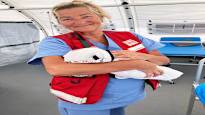Finnish midwife Minna Vanhamäki has faced human fates in the field hospital in Rafah, Gaza, which he will remember for the rest of his life.
One of them has remained the strongest in his mind. A woman who came to the field hospital’s maternity clinic had lost her entire family in the airstrike: her husband and two children. Now she arrived at the hospital to give birth to her third child.
– She had a healthy little baby boy, but overall the situation was tragic due to the background, Vanhamäki says.
Vanhamäki has been working as a midwife at the Red Cross field hospital in Rafah since the beginning of May. He talked about his experiences today, Friday, on Radio Suomen Päivä.
Some have already escaped
Israel has responded to the attacks of the extremist organization Hamas by targeting several attacks in Rafah during the spring. At the end of May, it carried out an airstrike on a refugee camp in Rafah. The attack killed many civilians and was widely condemned around the world.
For Gazans, the city has been the last refuge in the middle of the war. In addition, the border town of Rafah has been a key route for aid trucks, the number of which collapsed after the Israeli ground attack.
Vanhamäki works for a neutral humanitarian aid organization, and therefore does not take a position on the conflict itself. However, he says that the need for help in Rafah is huge.
– The emergency is great. Relatives are under great stress from their loved ones, and the lack of food and water is present every day. Several families have had to move three, even four times to find a slightly safer place to settle, so the situation is critical.
UN Population Fund UNFPA estimates at the end of May, that around 18,500 pregnant women have had to flee Rafah. Palestinian Refugee Organization According to UNRWA around 10,000 expectant mothers have remained in the area.
According to sources, access to health care and maternity supplies is limited in Gaza, and the health of both mothers and babies is at risk.
“The entire staff is happy with every newborn”
Vanhamäki works in the obstetrics and gynecology clinic set up in the field hospital of the International Committee of the Red Cross.
The night before the interview, three healthy babies had been born in the hospital.
– Even a small positive signal in these circumstances is always great news. The entire hospital staff is happy with each newborn. It’s always a positive thing that we’re really happy about, says Vanhamäki.
Healthcare is in crisis throughout Gaza. Hospitals have collapsed to the ground. Water and electricity supply have been disrupted, and there is also a serious lack of food and medicine in the area.
According to Vanhamäki, the dirty water in Rafah has caused stomach symptoms for the mothers and little by little malnutrition is also visible, but as a rule the mothers are still in fairly good condition.
– There is a crying shortage of nutrition, and especially of healthy food.
At the clinic, mothers are strongly encouraged to breastfeed because, according to Vanhamäki, it is an effective way to prevent malnutrition in babies. Newborns are mostly doing well, but there are plenty of older, malnourished children in Rafah.
Despite the surrounding crisis, Vanhamäki says that the working conditions at the field hospital are good. For example, the hospital has its own water purification system.
– We have a pretty good backup stock at the moment, our own equipment is sufficient for the time being.
Not all mothers can get help
In the midst of chaos, we try to monitor pregnancies as much as possible.
Vanhamäki is especially happy that the postpartum follow-up clinic has already been started little by little.
– We ask the mothers to return to the clinic after about six weeks, where we can check that the newborns are okay, and the mothers too, says Vanhamäki.
Patients also arrive at the women’s clinic from the hospital’s outpatient clinic. According to Vanhamäki, they always try to arrange the next visit so that the mother’s health can be confirmed before the birth.
However, not everyone can attend.
– In these conditions, it is very difficult to get going. It is understandable that mothers cannot always make it [tulemaan]even if they want to.
The explosions startle
Vanhamäki has been working at the Red Cross field hospital for a little over a month. He plans to come to Finland for a short vacation now, but will return to Rafah for three months.
Military operations in Rafah do not scare him.
– Of course, when fierce battle sounds and powerful explosions come close, it’s always startling. But my focus is strongly on my work duties, the hospital and the patients we are here for.
